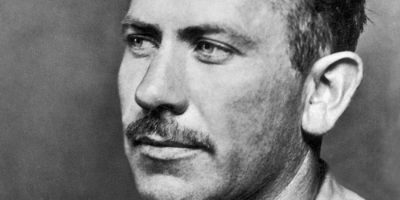
John Calvin 2.jpg Photo by Unknown author – Wikimedia Commons
Top 10 Facts about John Calvin
He was born Jehan Cauvin on July 10, 1509, at Noyon, Picardy in the province of the Kingdom of France. He was the second of three sons who survived infancy. His mother, Jeanne le Franc, was the daughter of an innkeeper from Cambrai. Calvin’s father, Gérard Cauvin, had a prosperous career as the cathedral notary and registrar to the ecclesiastical court. Gérard intended his three sons—Charles, Jean, and Antoine—for the priesthood.
1. He Published the form of Prayers and Church Hymns
In 1542, Calvin adapted a service book used in Strasbourg, publishing La Forme des Prières et Chants Ecclésiastiques (The Form of Prayers and Church Hymns). He recognized the power of music and he intended that it be used to support scripture readings. The original Strasbourg psalter contained twelve psalms by Clément Marot and Calvin added several more hymns of his own composition in the Geneva version. At the end of 1542, Marot became a refugee in Geneva and contributed nineteen more psalms. Louis Bourgeois, also a refugee, lived and taught music in Geneva for sixteen years and Calvin took the opportunity to add his hymns, the most famous being the Old Hundredth.
2. He was Famous for Preaching over 2 Thousand Sermons

Historical mixed media figure of John Calvin by George S. Stuart.jpg Photo by Peter d’Aprix – Wikimedia Commons
His turning point was in Geneva where he preached over two thousand sermons. In the beginning, he preached twice on Sunday and three times during the week. This proved to be too heavy a burden and late in 1542, the council allowed him to preach only once on Sunday. In October 1549, he was again required to preach twice on Sundays and, in addition, every weekday of alternate weeks. His sermons lasted more than an hour and he did not use notes. An occasional secretary tried to record his sermons, but very little of his preaching was preserved before 1549. In that year, professional scribe Denis Raguenier, who had learned or developed a system of shorthand, was assigned to record all of his sermons. An analysis of his sermons by T. H. L. Parker suggests that Calvin was a consistent preacher and his style changed very little over the years. John Calvin was also known for his thorough manner of working his way through the Bible in consecutive sermons. From March 1555 to July 1556, Calvin delivered two hundred sermons on Deuteronomy.
Read more about Christianity here.
3. He Encountered Great Opposition

John Calvin line drawing.jpg Photo by Unknown – Wikimedia Commons
Calvin encountered bitter opposition to his work in Geneva. Around 1546, the uncoordinated forces coalesced into an identifiable group whom he referred to as the libertines, but who preferred to be called either Spirituels or Patriots. According to Calvin, these were people who felt that after being liberated through grace, they were exempted from both ecclesiastical and civil law. The group consisted of wealthy, politically powerful, and interrelated families of Geneva. At the end of January 1546, Pierre Ameaux, a maker of playing cards who had already been in conflict with the Consistory, attacked Calvin by calling him a “Picard”, an epithet denoting anti-French sentiment, and accused him of false doctrine. Comeaux was punished by the council and forced to make expiation by parading through the city and begging God for forgiveness.
Later, Ami Perrin, the man who had brought Calvin to Geneva, moved into open opposition. Perrin had married Françoise Favre, daughter of François Favre, a well-established Genevan merchant. Both Perrin’s wife and father-in-law had previous conflicts with the Consistory. The court noted that many of Geneva’s notables, including Perrin, had breached a law against dancing. Initially, Perrin ignored the court order when he was summoned. However, he conceded when he received a letter from Calvin, he appeared before the Consistory.
4. He was Instrumental in Securing Protestants Reforms
After the death of Servetus, Calvin has acclaimed a defender of Christianity, but his ultimate triumph over the libertines was still two years away. He had always insisted that the Consistory retain the power of ex-communication, despite the council’s past decision to take it away. During Servetus’s trial, Philibert Berthelier asked the council for permission to take communion, as he had been excommunicated the previous year for insulting a minister. Calvin protested that the council did not have the legal authority to overturn Berthelier’s ex-communication.
Read more about the ex-communication here.
5. He was Supported by the Authorities

Portrait of John Calvin, French School.jpg Photo by Unidentified painter – Wikimedia Commons
In his preaching on September 3, 1553, he expressed that he might be dismissed by the authorities. However, after the council re-examined the Ordonnances on September 18, 1553, the vote was in his support. The decision was that Calvin—ex-communication was within the jurisdiction of the Consistory. Berthelier applied for reinstatement to another Genevan administrative assembly, the Deux Cents (Two Hundred), in November. This body reversed the council’s decision and stated that the final arbiter concerning ex-communication should be the council. The ministers continued to protest, and as in the case of Servetus, the opinions of the Swiss churches were sought. The affair dragged on through 1554. His win come when eventually the council announced the decision of the Swiss churches to keep the original Ordonnances and the Consistory was to regain its official powers on January 22, 1555.
6. The Published Work on his Faith
He published his first edition in March 1536, known as Institutio Christianae Religionis or Institutes of the Christian Religion. The work was an apologia or defense of his faith and a statement of the doctrinal position of the reformers. He did this as an elementary instruction book for anyone interested in the Christian faith. The book was the first expression of his theology. This became the beginning of his other works which he published throughout his life.
7. He Served as a Secretary to Princess
His relocation to Ferrara, Italy became a blessing to him as he served as secretary to Princess Renée of France. However, this did not take long as he was back in Paris this time with his brother Antoine. Antoine was in charge of his father’s affairs. Following the Edict of Coucy, which gave a limited six-month period for heretics to reconcile with the Catholic faith, Calvin decided that there was no future for him in France. In August he set off for Strasbourg, a free imperial city of the Holy Roman Empire and a refuge for reformers.
8. He Became a Pastor

John Calvin 20.jpg Photo by Verlag F. Werner – Wikimedia Commons
There was so much unrest in Strasbourg so he moved to Geneva. This is where he had an opportunity to meet William Farel. William was a fellow French reformer residing in the city. He was able to persuade him to stay and assist him in his work of reforming the church there. Calvin accepted his new role without any preconditions on his tasks or duties. He was eventually given the title of “reader”, which most likely meant that he could give expository lectures on the Bible. In 1537 he was selected to be a “pastor” although he never received any pastoral consecration. For the first time, the lawyer-theologian took up pastoral duties such as baptisms, weddings, and church services.
To read more about Pastors, click here.
9. The Birth of Eucharist and Confession of Faith
Both Farel and Calvin worked on the confession of faith in 1536. Farel drafted a confession of faith, and Calvin wrote separate articles on reorganizing the church in Geneva. They presented their work Articles concernant l’organisation de l’église et du culte à Genève (Articles on the Organization of the Church and its Worship at Geneva) to the city council on January 16, 1537. The document described the manner and frequency of their celebrations of the Eucharist, the reason for, and the method of, ex-communication, the requirement to subscribe to the confession of faith, the use of congregational singing in the liturgy, and the revision of marriage laws. The council accepted the document on the same day.
10. His Push to Reform France
His commitment to reform his homeland was overwhelming. However, the Protestant movement had been energetic but lacked central organizational direction. With financial support from the church in Geneva, Calvin turned his enormous energies toward uplifting the French Protestant cause. In addition, he supplied the dogma, the liturgy, and the moral ideas of the new religion, and he also created ecclesiastical, political, and social institutions in harmony with it. His skills being a born leader were seen when he followed up his work with personal appeals. His vast correspondence with French Protestants shows not only much zeal but infinite pain and considerable tact and driving home the lessons of his printed treatises. Between 1555 and 1562, more than 100 ministers were sent to France. Nevertheless, French King Henry II severely persecuted Protestants under the Edict of Chateaubriand and when the French authorities complained about the missionary activities, the city fathers of Geneva disclaimed official responsibility.
To read more about Christianity, click here.
Planning a trip to Paris ? Get ready !
These are Amazon’s best-selling travel products that you may need for coming to Paris.
Bookstore
- The best travel book : Rick Steves – Paris 2023 – Learn more here
- Fodor’s Paris 2024 – Learn more here
Travel Gear
- Venture Pal Lightweight Backpack – Learn more here
- Samsonite Winfield 2 28″ Luggage – Learn more here
- Swig Savvy’s Stainless Steel Insulated Water Bottle – Learn more here
Check Amazon’s best-seller list for the most popular travel accessories. We sometimes read this list just to find out what new travel products people are buying.









